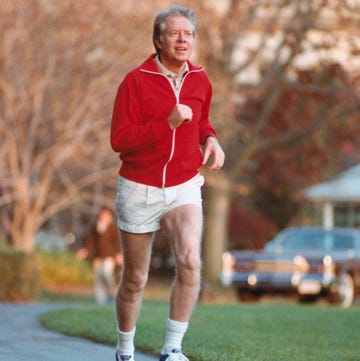Bao believes BodyNet will first be used to monitor patients with sleeping or heart conditions wonky sensors connected to wires that hang all over your face, making you look like you’re caught in a spider web?
Or how about clinical stress tests? Or even just working out with your Fitbit on your wrist to track your heart rate and overall health?
Free ‘Fitness Tracker’ May Predict Your Health?
Well, researchers at Stanford University have created a new solution that’s more like a stick-on tattoo than a slew of crazy cords or a heavy exercise tracker. They call it “BodyNet” and claim it could be next-generation tech for sensors used in both medical applications and for recreational health check-ins.
Zhenan Bao, Ph.D., a chemical engineering professor at Stanford and leader of the team that created BodyNet, told Popular Mechanics that it’s all about placing the sticker sensors where the anticipated activity is taking place.
“Depending on what a person wants to measure...like heart rate, the person can skip [putting] sensors on their arm or wrist...they can just put it on their chest,” she said.
So you could place a sticker on your heart or even your arms to see how they’re swinging during exercise. With a smartwatch or Fitbit, by contrast, the hardware can only be attached to the wrists, Bao said.
“There is some information that can be obtained, like heart rate and the number of steps, but it’s not possible to know if my arms are moving in sync with my legs or how much my hand is waving as compared to my arm.”
BodyNet, for its part, can dig even further into the physiological data to see if you have any blockages in your blood vessels near the sticker. You can also check your muscle activity to see if your core is actually engaged during a given exercise, Bao said.
The operation takes more than just a sticker, of course, to evaluate results, said Bao. “The key idea is to separate the stretchy and the soft component that needs to be close to the human body...from the rigid parts that are uncomfortable to wear.”
The rigid part that Bao mentions includes a casing you wear on or under your clothing that contains Bluetooth, a battery, and all electronic components to power the BodyNet sensor. All of the data, then, is sent to your phone via Bluetooth.
[implant RFID chips into your arm to start your Tesla Runner’s World Training Plan, designed for any speed and any distance.]
Deputy Editor, Features.
“Soon it’ll be possible to pull together physiological data without interrupting a person’s normal behavior,” she said.
It took a 14-person team over three years to design these sensors. Ideally, the researchers wanted to fabricate something comfortable to wear that required no batteries or rigid circuits to prevent the stickers from stretching and contracting with the skin.
The solution? A variation of RFID, which stands for radiofrequency identification and is used in hotel room keys to gain keyless access. (Apparently you can even Foot Locker XC Results.)
Similar to a hotel key card, BodyNet has an antenna that harvests some of the incoming RFID energy from a receiver on the clothing to power its sensors. The BodyNet sticker then sends those data points from the skin back to the receiver, which is clipped to an item of clothing.
Both Stanford and Samsung have invested an undisclosed amount of funding into the project, according to Bao. So should we expect a state-of-the-art Samsung-branded fitness tracker in the future? Or even a medical device?
Bao said the lab still needs more funding to take the next leap.
For one, she intends to commercialize the technology. That means looking for the right business model and, in turn, the best manufacturer for the market she wants to target.
“That's the part I really can’t predict,” she said.
Plus, there’s the added cost of U.S. Food and Drug Administration (FDA) approvals. Not only can this process take years, but it’s also costly. Bao said the sleep apnea test situation—wherein people will use that data about their medical conditions to make a decision—must be FDA-approved.
Anything more recreational to monitor your health, like a Fitbit or BodyNet setup, does not require FDA approval. That means it’ll likely hit the market first.
What’s next for Bao and her lab?
The team is already working on a slew of new wireless sensors that stick to the skin and work together with smart clothing to accurately track an even wider variety of health indicators than today’s smartphones and smartwatches do. Bao said the sensors need to be smaller in their next iteration if the team ever hopes to sell BodyNet en masse.
“Some may not want others to see [the stickers],” she said.
Source: Stanford University
Before joining Pop Mech, This Press-On Sticker Could Someday Monitor Your Health Pittsburgh Post-Gazette. She is a graduate of the University of Pittsburgh, where she studied English and economics. Her favorite topics include, but are not limited to: the giant squid, punk rock, and robotics. She lives in Philadelphia with her husband, her black cat, and towers upon towers of books.















